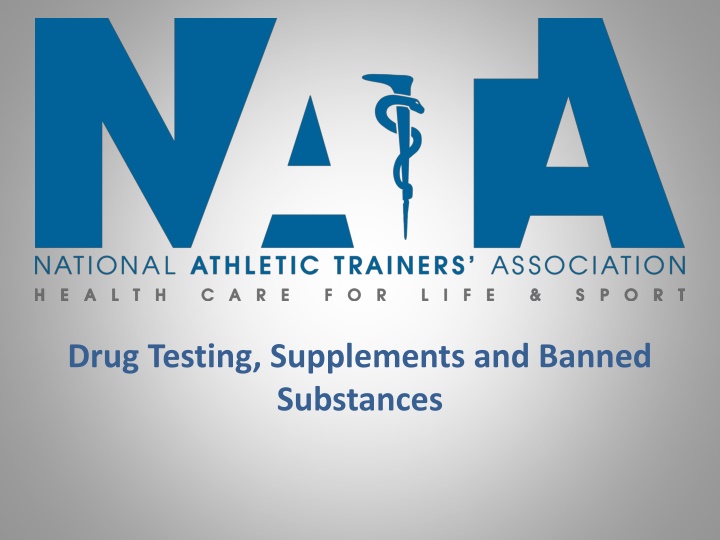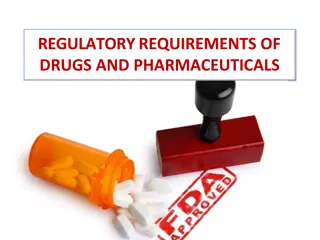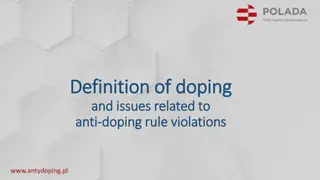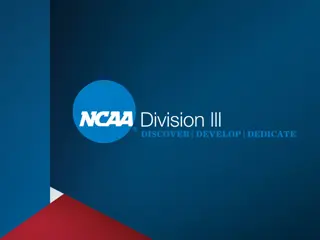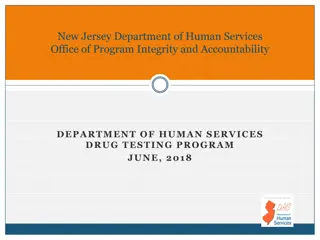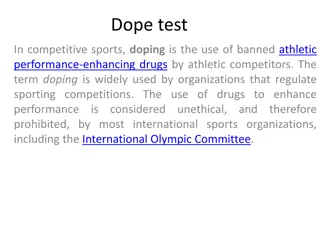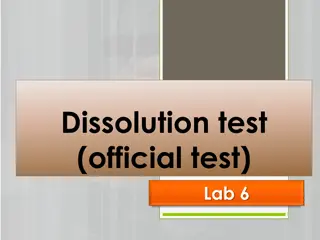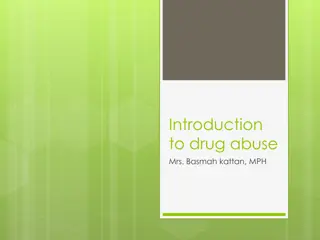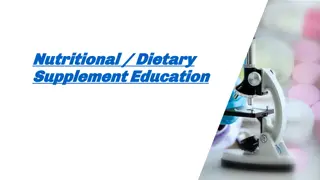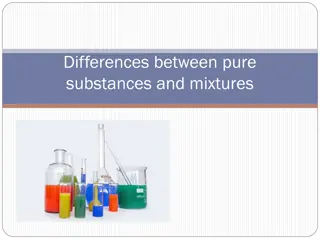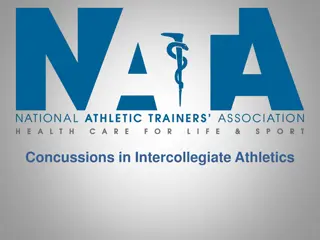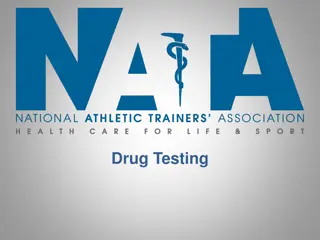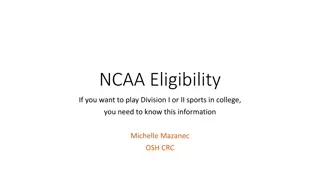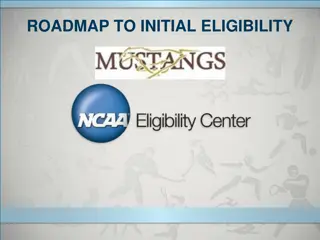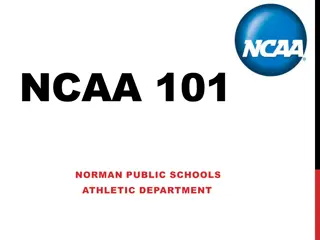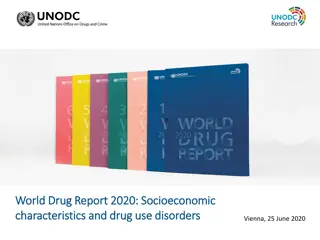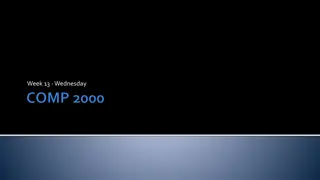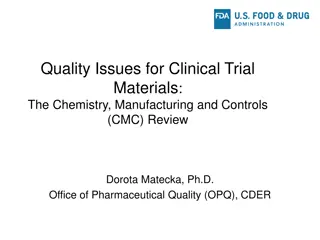NCAA Drug Testing and Banned Substances Guidelines
The NCAA annually disseminates a list of banned drug classes and provides drug education to student-athletes, including mid-year transfers. Drug testing programs focus on prevention and safety, with sanctions in place to uphold competitive balance. Testing includes steroids, stimulants, and recreational drugs, with strict penalties for positive tests. Various classes of banned substances and procedures are outlined, emphasizing the importance of athletes checking with designated staff before using any substance. For the most current list of banned substances, refer to the NCAA website.
Download Presentation

Please find below an Image/Link to download the presentation.
The content on the website is provided AS IS for your information and personal use only. It may not be sold, licensed, or shared on other websites without obtaining consent from the author.If you encounter any issues during the download, it is possible that the publisher has removed the file from their server.
You are allowed to download the files provided on this website for personal or commercial use, subject to the condition that they are used lawfully. All files are the property of their respective owners.
The content on the website is provided AS IS for your information and personal use only. It may not be sold, licensed, or shared on other websites without obtaining consent from the author.
E N D
Presentation Transcript
Drug Testing, Supplements and Banned Substances
NCAA Alcohol, Tobacco, and Other Drug Education NCAA Bylaws requires disseminating an annual list of banned drug classes and an annual drug education to all student-athletes Includes mid-year transfers Most drug testing programs are designed to be preventative rather than punitive Sanctioning is established to insure competitive balance and athlete safety
NCAA Drug Testing Year-Round Testing on Campus NCAA Championships and Postseason Bowl Games NCAA tests for steroids, peptide hormones, and masking agents year-round Also test for stimulants and recreational drugs during championships Positive Performance Enhancement Drug Test Loss of one full year of eligibility for the 1st offense and withheld from competition for 365 days from the date of the NCAA drug test The 2nd positive for a PED would result in the loss of all remaining eligibility Positive Illicit Drug Test Ineligible 50% season in all sports student-athlete participates Tampering with NCAA Drug Test Ineligible for 2 consecutive years, 730 days August 2022 THC metabolite test value change: 150ng/ml Institutional Education, no loss of eligibility from NCAA Appeal process for a positive test
NCAA Banned Drugs The NCAA bans the following classes of drugs: Stimulants Peptide Hormones, Growth Factors, and Analogues Alcohol and Beta Blockers (banned for rifle only) Hormone and Metabolic Modulators Diuretics and Other Masking Agents Beta-2 Agonists Narcotics Cannabinoids Note: Any substance chemically related to these classes is also banned Drugs and Procedures Subject to Restrictions: Blood doping Local anesthetics (under some conditions) Gene doping Manipulation of urine samples Tampering with urine samples Beta-2 Agonists It is the responsibility of the student-athlete to check with the appropriate or designated athletics staff and/or National Center for Drug Free Sport before using any substance There is no complete list of banned substances List may change annually, refer to https://www.ncaa.org/sports/2015/6/10/ncaa-banned- substances.aspx for current list of banned substances
Medical Exceptions The NCAA allows for Medical Exceptions of some banned substances, such as stimulants, anabolic agents and ADHD Medications, for documented medical conditions Pre-approval is required for use of anabolic agents, peptide hormones, growth factors, and hormone and metabolic modulators A Medical Exception Reporting Form can be found on the NCAA website for athletes that may require medication which may trigger a positive drug test Medical Exceptions Procedures - NCAA.org If your student-athletes fall under other governing bodies (i.e.. USA Track and Field, IOC, USA Wrestling, etc.), they may/will be subject to their drug testing guidelines
Drug Class Examples of Banned Drugs in Class Stimulants Amphetamine (Adderall); Caffeine (Guarana), Cocaine, Ephedrine, Methylphenidate (Ritalin), Mephedrone (Bath salts) Anabolic Agents Androstenedione, Testosterone, DHEA (7-Keto) Alcohol and Beta Blockers (rifle only) Alcohol, Atenolol, Nadolol, Proprandolol, Timolol Diuretics and Masking Agents Bumetanide, Spironolactone (Canrenone), Hydrochlorothiazide Narcotics Heroin, Fentanyl, Hydrocodone, Morphine, Oxycodone Cannabinoids Marijuana, Synthetic cannabinoids (Spice, K2), Tetrahydrocannabinol (THC, Delta-8) Peptide Hormones, Growth factors Growth hormone (hGH), Erythropoietin (EPO), human chorionic gonadotropin (hcG) Hormone and Metabolic Modulators Anti-estrogen, Tamoxifen Beta- 2 Agonists Bambuterol, Formoterol, Salbutamol, Salmeterol
Institutional Drug Testing A written policy must be created that includes: Purpose of the program Who will be tested Testing Methods Substances Tested for Sanctions for a positive test Disclosure of all medications and supplements Counseling/Treatment options Consult with institutional legal department and risk management in policy creation and institutional drug testing consent form Review policy with all student-athletes annually
Nutritional and Dietary Supplements Dietary Supplements are not well regulated and may cause a positive drug test. There is not a complete list of banned substances as the market is ever changing Studies have found 12-25% of Dietary Supplements contain unlisted steroids, stimulants or trace metals(www.drugfreesport.com) Many dietary supplements are contaminated with banned drugs not listed on the label Any product containing a dietary supplement ingredient is taken at the risk of the student- athlete For more Information about Supplements and Banned Drugs, consult the Drug Free Sport Axis webpage https://axis.drugfreesport.com/login (formerly the Resource Exchange Center) Institutions should identify a contact person for information on nutritional and/or dietary supplement use
References www.NCAA.org/drugtesting
